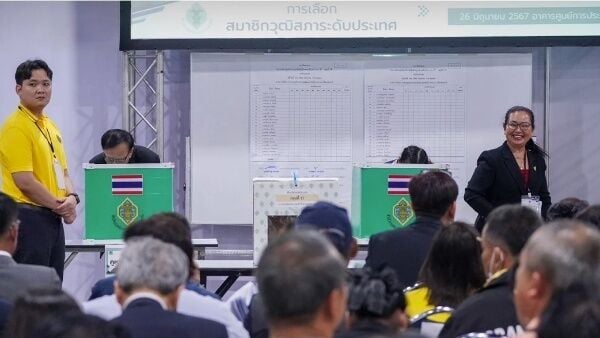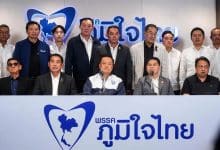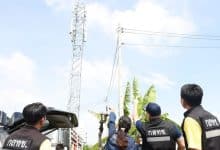Army general tops polls in national Senate election

The Election Commission (EC)’s vote counting began at 9.40pm yesterday and concluded around 5am today, revealing the biggest political surprise of the year. With 2,989 candidates vying for seats, the new Senate will comprise 200 members from 20 professions, replacing the 250 junta-appointed senators whose term expired on May 10.
Former 4th Army Region Commander General Kriangkrai Srirak, a classmate of Deputy Prime Minister Anutin Charnvirakul, secured the highest votes in group 1 (public administration and national security) with 74. Meanwhile, former Khon Kaen MP Premsak Piayura emerged victorious in group 4 (public health).
Among the winners in group 7 (non-governmental employees) was Lae Dilokwitthayarat, an economics lecturer at Chulalongkorn University. Notable winners in group 17 (NGOs) included Prapart Pintobtaen, director of the Chulalongkorn University Social Research Institute, and human rights activist Angkhana Neelaphaijit.
Celebrity lawyer Sittra Biabungkerd secured a reserve spot, while group 18 (sports, mass media, and literature) saw triumphs for Chaiyong Maneerungsakul, president of the Southern Press Association, Nanthana Nanthawaropas, dean of Political Communication College at Krirk University, and Chib Jitniyom, Nation TV’s news anchor.
In group 20 (Others), notable winners included Police Major General Yutthana Thaipakdee, a former investigator of the government’s rice-pledging scheme, and Alongkot Vorakee, former deputy Uthai Thani governor.
The official list of 200 winners and 100 reserves will be announced today, June 27, by the EC, reported The Nation.
ORIGINAL STORY: Former PM Niwatthamrong faces Senate election defeat
Former Deputy Prime Minister Niwatthamrong Boonsongpaisan faced an early exit in the first round of the national Senate elections yesterday, June 26. Despite his loss, Niwatthamrong, who served as caretaker prime minister following Yingluck Shinawatra’s removal by the Constitutional Court in 2013, remains unbowed and resolute.
Niwatthamrong admitted that, like his fellow candidates, he had cast a vote for himself in the initial round.
“I have no regrets about contesting.”
To rally support quickly, Niwatthamrong utilised the Line app to introduce himself to other candidates within his professional group.
“It was the most efficient way to garner support in such a short time.”
The Senate election is a multi-tiered process, conducted across district, provincial, and national levels, each with two rounds. In the first round of each level, candidates cast two votes within their professional group, including a vote for themselves. The second round requires voting for candidates outside their group, with contenders coming from 20 different professional sectors.
When asked about the electoral system, Niwatthamrong chose not to comment on its intricacies.
“It’s a new system that needs to be tested.”
Rumours of collusion and lobbying among candidates have surfaced, but Niwatthamrong refrained from speculation.
“It’s up to the Election Commission to investigate any irregularities.”
Niwatthamrong entered the political fray with a sense of purpose. He hinted at his undiminished dedication to public service despite the setback, reported The Nation.
“I still feel strong enough to work for the country.”
Latest Thailand News
Follow The Thaiger on Google News:


























